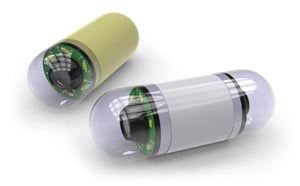 The “capsule” used in a capsule endoscopy is a small wireless camera enclosed in a container about the size of a vitamin. When swallowed, this capsule makes its way throughout the entire digestive tract, capturing important images along the way that can clue doctors in to any potential issues. Most importantly, it can give a detailed glimpse into the small intestine – an area difficult to reach with traditional endoscopy procedures.
The “capsule” used in a capsule endoscopy is a small wireless camera enclosed in a container about the size of a vitamin. When swallowed, this capsule makes its way throughout the entire digestive tract, capturing important images along the way that can clue doctors in to any potential issues. Most importantly, it can give a detailed glimpse into the small intestine – an area difficult to reach with traditional endoscopy procedures.
How is a Capsule Endoscopy Performed?
Prior to swallowing the capsule, a special belt-like recorder is worn around the waist. In some devices, this recorder may also connect to patches placed on the abdomen. Once the recorder device is in place and functioning properly, the capsule can be swallowed with water. Then, the patient can continue about their normal day as key information is being transmitted from the capsule to the recorder all the while. From beginning to end, the process takes about eight hours to complete. Although the process may be over sooner, depending on how long it takes the body to fully pass the capsule. At the end, physicians are able to review a detailed report and images in order to reach a diagnosis.
What Conditions can a Capsule Endoscopy Diagnose?
Given the ease and thoroughness of a capsule endoscopy, there are several reasons why a gastroenterologist may recommend the procedure. Conditions it can commonly be used to diagnose include:
- Causes of gastrointestinal bleeding
- Crohn’s and other forms of inflammatory bowel disease
- Undiagnosed Anemia
- Polyps
- Celiac disease
- Certain types of cancer
Capsule Endoscopy in Baton Rouge
In the Baton Rouge area, Lane Gastroenterology is happy to include capsule endoscopy among our many service offerings to best protect the gastrointestinal health of our patients. To learn more about the procedure and if it may be right for you, contact us by clicking below or calling directly at (225) 658-6780.




